Building modern countryside and civilized farmers in the spirit of Resolution of the 13th National Party Congress
(Baonghean.vn) - The Party's XIII Congress documents clearly orient: "Promoting agricultural restructuring, developing rural economy associated with building new rural areas, towards ecological agricultural models, modern rural areas, civilized farmers..."(1). To implement the above policy, it is necessary to clearly understand the content of building modern rural areas and civilized farmers in the coming time.
MODERN RURAL CONSTRUCTION
The content of modern rural construction is to effectively implement the National Target Program on new rural construction for the 2021-2025 period and the following periods. Implementing the Resolution of the 13th National Party Congress, the Prime Minister issued Decision No. 263/QD-TTg dated February 22, 2022 approving the National Target Program on new rural construction for the 2021-2025 period, Decision No. 318/QD-TTg dated March 8, 2022 promulgating the National Criteria Set for new rural communes, the National Criteria Set for advanced new rural communes for the 2021-2025 period and Decision No. 320/QD-TTg promulgating the National Criteria Set for new rural districts, stipulating towns and provincial cities to complete the task of new rural construction and the National Criteria Set for advanced new rural districts for the 2021-2025 period.
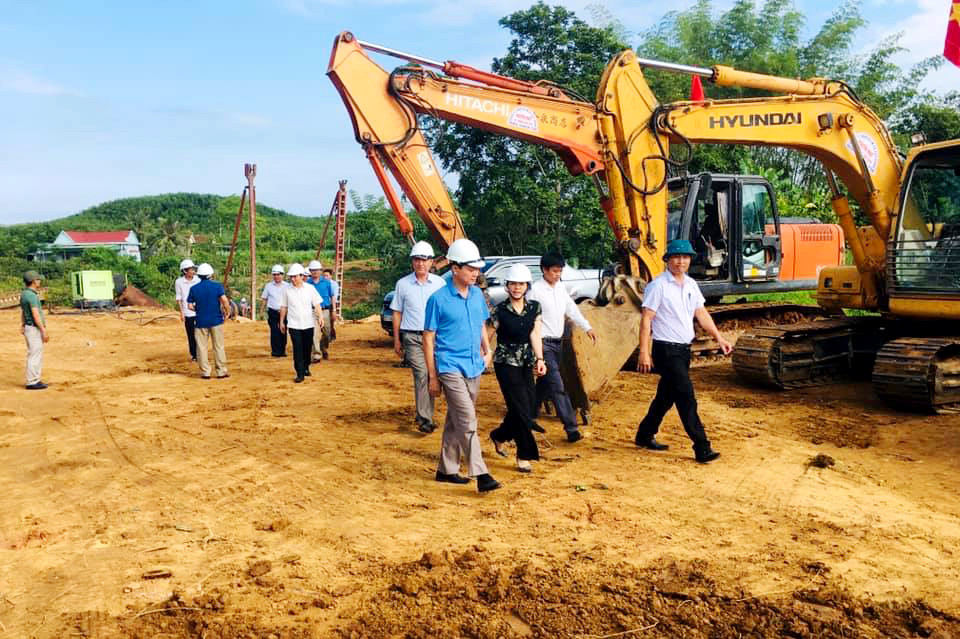 |
Leaders of Nghia Dan district inspect the new rural construction project. Photo: Lien Thanh |
To build modern rural areas, first of all, Party committees at all levels must lead the entire political system to promote people's mastery, exploit all resources to effectively implement the set of criteria for new rural communes and the set of national criteria for advanced new rural communes in the 2021-2025 period.
Modern rural constructionThere must be appropriate planning in line with the socio-economic development orientation with a long-term vision, with functional residential areas, industrial parks, small-scale industries and services to ensure the creation of many high-income jobs for rural residents, contributing to the goal of "leaving agriculture but not leaving the countryside", associated with good environmental protection. At the same time, strengthen planning management and organize effective implementation according to the planning. Exploit and promote all resources to build socio-economic infrastructure such as transportation, irrigation, electricity, cultural facilities, trade, information and communication, and rural residential housing to gradually become synchronous, high-quality and effective.
Building modern rural areas is associated with progress in implementing income criteria, multidimensional poverty reduction, having a high rate of trained workers, developing diverse linkage models, cooperative models, agricultural extension, craft village development, etc. for effective production and business. Building modern rural areas must be associated with cultural - social - environmental development such as education and training, health care, culture, environmental protection and food safety. At the same time, modern rural areas need to build a strong political system with a team of leaders, managers, civil servants and public employees with knowledge, experience, good qualities and ethics, and closeness to the people.
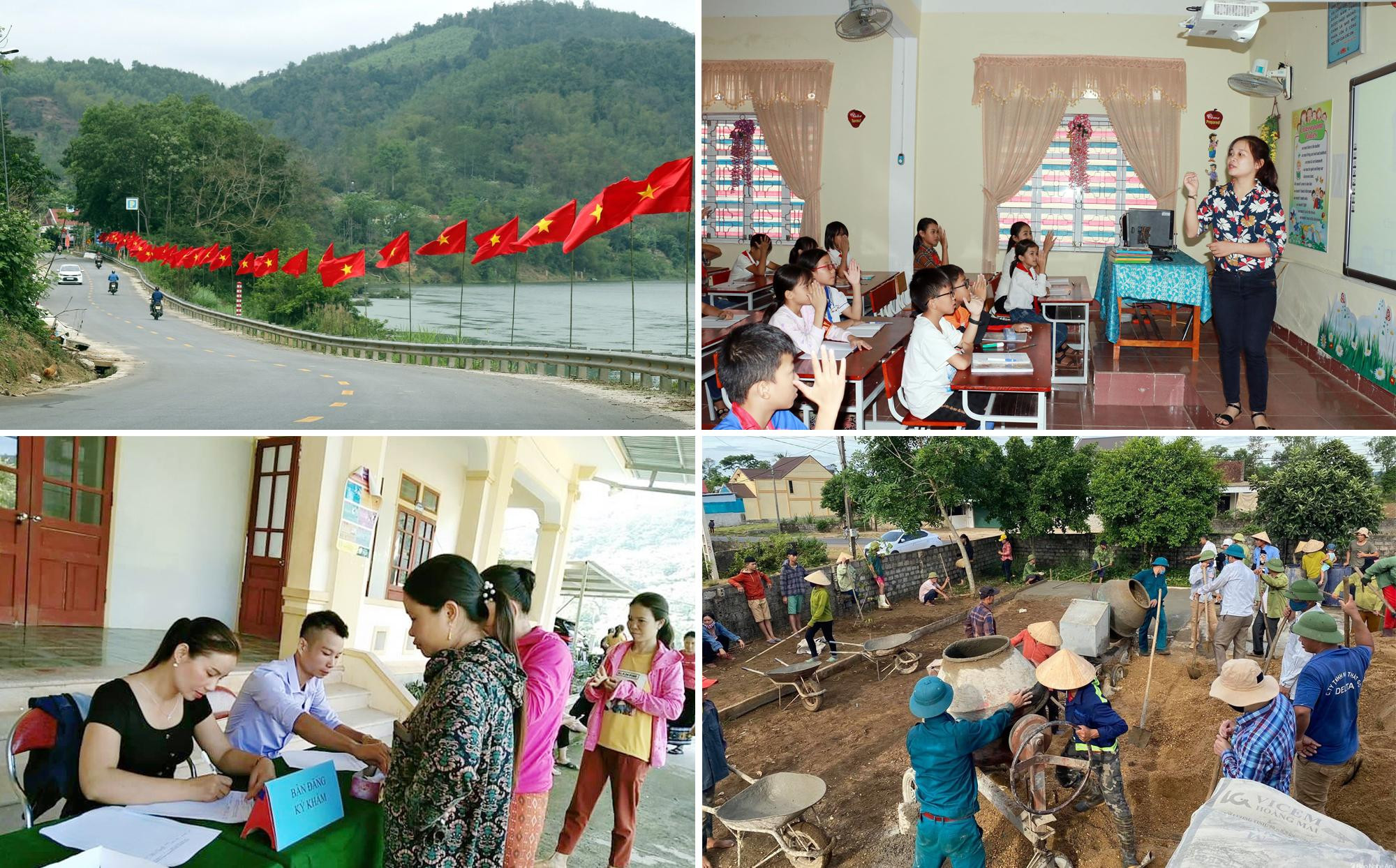 |
Modern rural construction must be associated with cultural - social - environmental development. Photo: Document |
On that basis, we will strive to gradually achieve the general goal of the National Target Program on New Rural Development that the Prime Minister has signed and approved in Decision No. 263/QD-TTg: “Effectively restructure the agricultural sector, develop the rural economy, the urbanization process, go into depth, effectively, sustainably, implement advanced new rural areas, model new rural areas and new rural areas at the village and hamlet levels. Improve the material and spiritual life of rural people, promote gender equality. Build synchronous and gradually modern rural socio-economic infrastructure, ensure a bright, green, clean, beautiful, safe rural environment and landscape, rich in traditional cultural identity, adapt to climate change and sustainable development”.
To achieve that great goal, first of all, ministries, functional branches, Party committees and authorities of provinces and cities must strengthen propaganda and dissemination of issued resolutions, decisions, circulars and guidelines on rural construction, creating a profound change in awareness among each cadre, party member and citizen. Promote and exploit all capital sources, including investment capital, career capital, central capital, local capital, socialized capital to build infrastructure, develop the economy, and preserve rural cultural identity. In particular, pay attention to leading and directing the reorganization of production, a factor in increasing farmers' income.
Reorganization of production must be closely linked with reorganization of rural society in the direction of cooperation and association in production, preservation, processing, trading of agricultural products, craft village products and development of agricultural tourism, community tourism, etc.
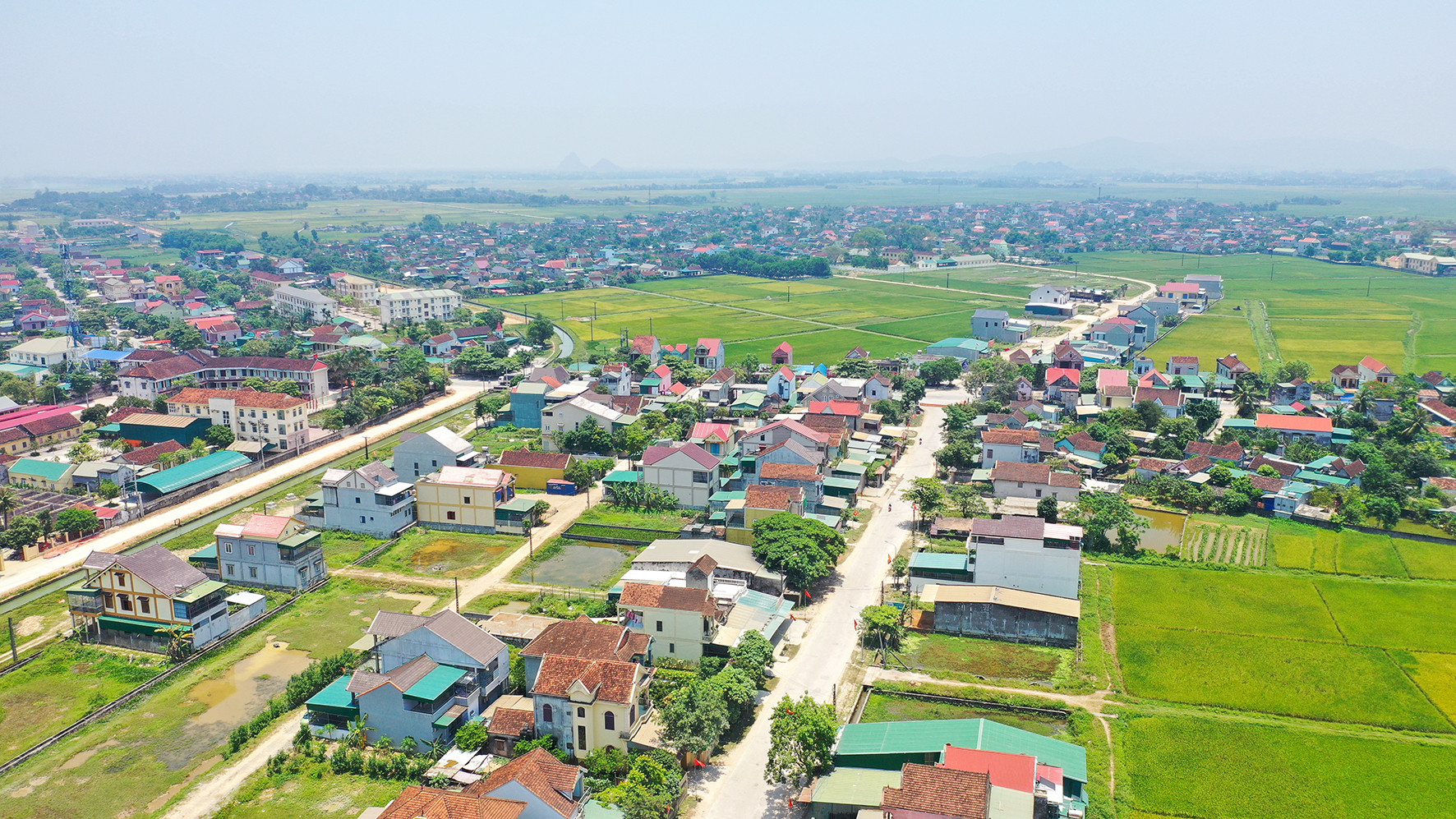 |
Many rural areas in Yen Thanh have prospered thanks to the investment of the State and the joint efforts of the people. Photo: Nguyen Book |
BUILDING CIVILIZED FARMERS
Building civilized farmersis a very big and important issue as stated by our Party in Resolution No. 19-NQ/TW dated June 16, 2022: "Farmers are the subject and center of the process of agricultural development, rural economy and new rural construction"(2).
For farmers to reach a level of civilization and take on the role of the subject and the central position, it takes time, method, and specific positive steps. According to the Central assessment, "the income and material and spiritual life of rural residents are constantly improving, the rate of poor households is decreasing rapidly, and the number of well-off and rich households is increasing."(3)However, "vocational training, job creation, and restructuring of rural labor still have many shortcomings. Rural labor tends to age, labor productivity and average income of rural residents are still low, the poverty rate is still high, especially in remote areas and ethnic minority areas."(4).
A civilized farmer must first of all be an educated farmer. To do so, the Party Committee must lead the entire political system to do a good job of propaganda so that each farmer can change his awareness of his role as a subject, have a self-reliant mindset, have knowledge, skills, capacity, and courage to master himself, master the construction and development of rural communities.
The press agencies are sharp and effective tools to regularly update and convey information to farmers. Therefore, it is necessary to strengthen direction and investment in building these agencies to be strong and to properly implement their principles and purposes.
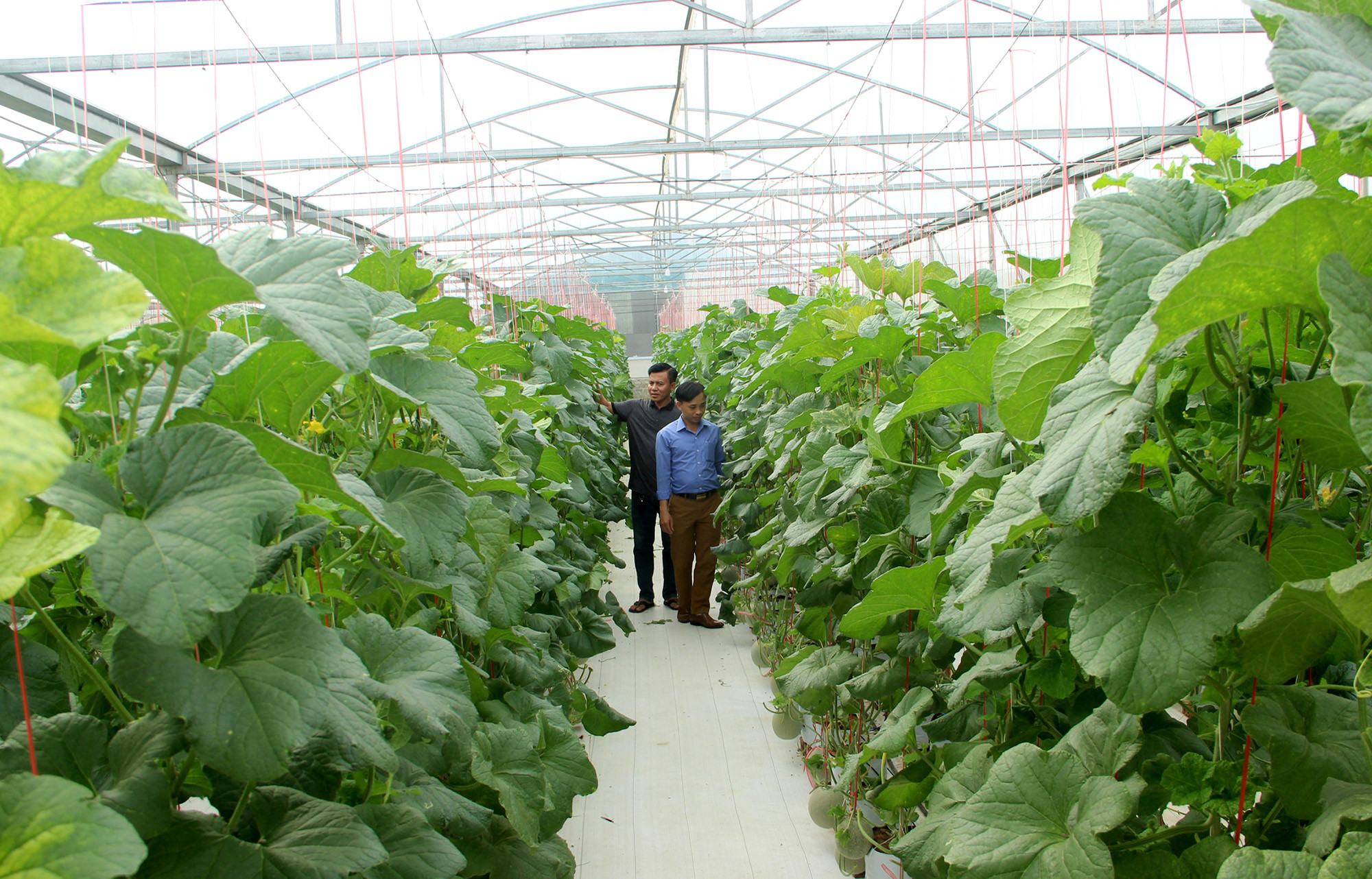 |
Model of growing melons in greenhouses in Khanh Hop commune, Nghi Loc district. Photo: Quang An |
On that basis, the central functional departments, ministries, branches, Party committees and authorities at all levels have synchronous, scientific and practical solutions for rural areas to gradually implement "farmer intellectualization". The State will soon supplement mechanisms and policies to support farmers in accessing, training knowledge, training skills, updating advanced techniques and technologies, being equipped with knowledge of the market economy, mastering machinery and technological equipment, etc. With knowledge, farmers will self-discover problems arising in the production and business process, know how to research, analyze and solve factors related to productivity, quality, product prices, etc. With knowledge, farmers will be more proactive in handling the impacts of climate change, natural disasters, epidemics, as well as know how to effectively use new varieties, pesticides, veterinary drugs, food safety and hygiene, etc.
The State continues to supplement mechanisms and policies to create the best environment and conditions for the connection of the four houses (Farmers, State, scientists, and entrepreneurs). The closer and more effective this connection is, the more knowledge farmers will have, and agriculture will develop quickly and sustainably. Research is needed to plan and develop training schools for farmers and farmers' children, because to have a professional agriculture, there must be a team of professional farmers. To have a knowledge-based agriculture, farmers must be educated.
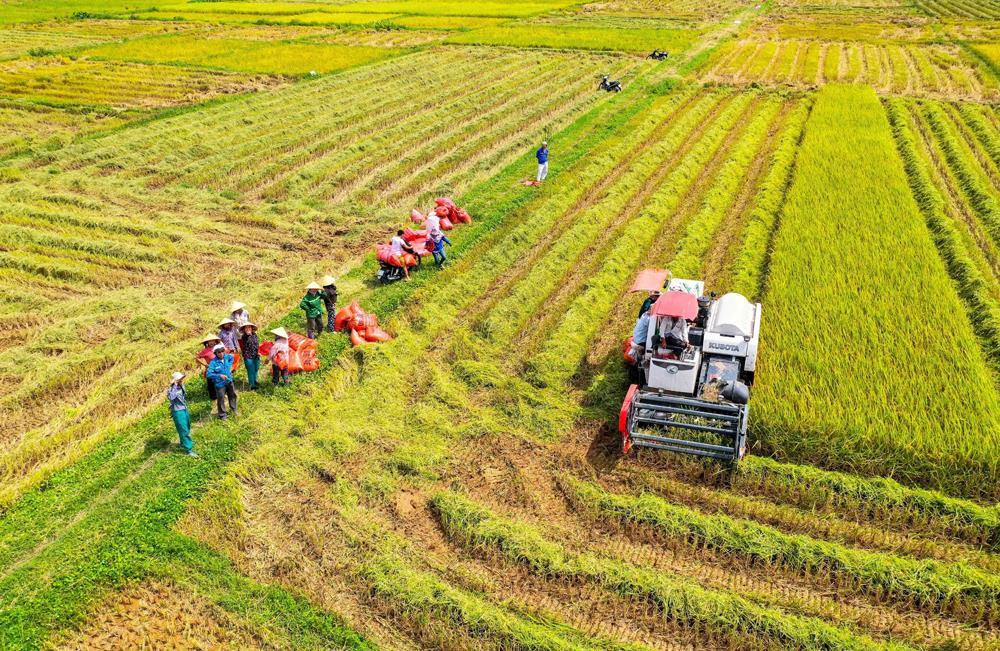 |
Farmers in Quynh Vinh commune (Hoang Mai town) harvest the winter-spring rice crop in a large-scale field. Photo: Thanh Yen |
In addition to providing knowledge about production, business, enterprise management, and cooperatives, it is necessary to equip civilized farmers with cultural knowledge so that they can proactively participate with the community in organizing recreational activities, physical training, sports, health training, and building spiritual life in rural areas. At the same time, equipping knowledge so that farmers can be autonomous in contributing to protecting, embellishing, and promoting the heritage, traditions, and good cultural identities of ethnic groups, regions, and areas in the country. Civilized farmers are those who are conscious of protecting nature, protecting the environment, building "village and neighborhood love", supporting and voluntarily building cooperatives, building connections to develop the economy, and developing rural culture.
Building modern countryside and civilized farmers in the spirit of the Resolution of the 13th National Party Congress is one of the major and consistent policies to contribute significantly to realizing the goal of "Rich people, strong country, democracy, equality, civilization" in the process of national renewal, orienting towards socialism.
(1) - Documents of the 13th National Congress, Vol. 1, p. 44.
(2) - Documents of the 5th Central Committee Conference, National Political Publishing House, p. 93.
(3) - Documents of the 5th Central Committee Conference, National Political Publishing House, p. 91.
(4) - Documents of the 5th Central Conference of the Central Committee, National Political Publishing House, p.91.


